Marriage coaching is a valuable resource for couples seeking guidance and support in their relationship journey. With the complexities and challenges that often arise in married life, it is not uncommon for couples to feel overwhelmed or unsure of how to navigate through difficult times. This is where marriage coaching comes in, providing a professional and objective perspective to help couples strengthen their bond and create a fulfilling partnership. In this blog post, we will explore the benefits of marriage coaching and how it can positively impact the dynamics of a relationship. Whether you are newlyweds looking to establish a solid foundation or a long-term couple seeking to reignite the spark, marriage coaching offers a tailored approach to address your unique needs and goals. Let’s delve into the world of marriage coaching and discover how it can transform your relationship into one that thrives and endures.
The Benefits of Marriage Coaching: How it Can Strengthen Your Relationship
Welcome to the world of marriage coaching, where couples can find guidance, support, and tools to enhance their relationship. Marriage coaching is an effective way to address challenges, improve communication, and strengthen the bond between partners. In this article, we will explore the various benefits of marriage coaching and how it can positively impact your relationship.
1. Enhancing Communication
Effective communication is the foundation of a healthy and thriving marriage. However, many couples struggle to express their needs, concerns, and emotions in a constructive manner. Marriage coaching provides a safe and supportive environment for couples to learn and practice effective communication techniques. Through guided discussions and exercises, couples can develop better listening skills, express themselves more clearly, and understand each other’s perspectives.
Coaches often teach couples how to use “I” statements to express their feelings and needs without blaming or criticizing their partner. This approach fosters empathy and understanding, creating a more harmonious and respectful atmosphere within the relationship. By improving communication, couples can resolve conflicts more effectively, prevent misunderstandings, and deepen their emotional connection.
Furthermore, marriage coaching can help couples identify and overcome communication barriers such as defensiveness, stonewalling, and contempt. Coaches provide valuable insights into the underlying causes of these barriers and offer strategies to overcome them. As couples become more skilled in communication, they can navigate challenging topics with greater ease and maintain a stronger emotional bond.
2. Resolving Conflicts
Conflicts are inevitable in any relationship, but how couples handle them can make a significant difference in their long-term happiness. Marriage coaching equips couples with essential conflict resolution skills, allowing them to address disagreements in a healthy and productive manner. Coaches guide couples through the process of identifying the root causes of conflicts, exploring different perspectives, and finding mutually beneficial solutions.
One common technique used in marriage coaching is “active listening,” where partners take turns expressing their thoughts and feelings while the other person listens attentively. This practice promotes empathy and understanding, reducing the likelihood of escalating conflicts. Coaches also teach couples how to use effective negotiation and compromise techniques, enabling them to reach agreements that satisfy both partners.
Moreover, marriage coaching helps couples identify unhealthy patterns and dynamics that contribute to recurring conflicts. Coaches provide insights into the underlying issues and guide couples towards healthier behaviors and attitudes. By addressing conflicts head-on and learning constructive ways to resolve them, couples can prevent resentment from building up and maintain a more harmonious relationship.
3. Strengthening Emotional Connection
Emotional connection is a vital aspect of a fulfilling marriage. However, the demands of daily life, stress, and other factors can strain the emotional bond between partners. Marriage coaching offers couples the opportunity to reconnect emotionally and reignite the spark in their relationship.
Coaches help couples identify and express their emotional needs, fostering a deeper understanding and empathy towards one another. Through various exercises and activities, couples can rediscover the joy, love, and intimacy they once shared. Coaches may also provide guidance on how to prioritize quality time together, engage in meaningful conversations, and create shared experiences.
Additionally, marriage coaching can assist couples in healing emotional wounds and rebuilding trust. Coaches help couples navigate past traumas, infidelity, or other significant challenges that may have eroded trust in the relationship. By providing a supportive and non-judgmental space, coaches facilitate the process of forgiveness, healing, and rebuilding a stronger foundation of trust.
In conclusion, marriage coaching offers numerous benefits that can strengthen your relationship. From enhancing communication and resolving conflicts to strengthening emotional connection, the guidance and support provided by marriage coaches can empower couples to create a more fulfilling and harmonious partnership. Consider embarking on this transformative journey to nurture and enrich your marriage.

Finding the Right Marriage Coach: Tips for Choosing the Best Fit for Your Needs
Introduction
Marriage coaching has gained significant popularity in recent years as couples seek professional guidance to navigate the complexities of their relationships. A marriage coach can provide valuable insights, tools, and strategies to help couples improve communication, resolve conflicts, and strengthen their bond. However, finding the right marriage coach who understands your unique needs and can guide you effectively is crucial. In this article, we will explore some essential tips to help you choose the best fit for your marriage coaching journey.
1. Clarify Your Goals and Expectations
Before embarking on the search for a marriage coach, take the time to clarify your goals and expectations. Reflect on what you hope to achieve through marriage coaching. Are you looking to enhance communication skills, resolve specific conflicts, or strengthen your overall relationship? Understanding your objectives will help you find a marriage coach who specializes in the areas you wish to focus on.
Additionally, consider your expectations from the coaching process. Are you open to trying new techniques and approaches? Do you prefer a more structured or flexible coaching style? By identifying your expectations, you can better evaluate potential coaches and ensure they align with your needs.
Remember, effective marriage coaching is a collaborative process, and having a clear vision of your goals and expectations will set the foundation for a successful coaching experience.
2. Research and Gather Information
Once you have a clear understanding of your goals and expectations, it’s time to research and gather information about potential marriage coaches. Start by seeking recommendations from trusted friends, family members, or even your therapist. Personal referrals can provide valuable insights into the coaching experience and outcomes.
Additionally, utilize online resources such as directories, forums, and social media platforms to find marriage coaches in your area. Read reviews and testimonials to gauge the satisfaction levels of previous clients. Pay attention to coaches who specialize in the specific areas you wish to address in your marriage.
Take the time to explore each coach’s website, blog, or articles they have written. This will give you a sense of their expertise, coaching style, and philosophy. Look for coaches who emphasize empathy, non-judgment, and a client-centered approach. A coach who resonates with your values and beliefs is more likely to create a comfortable and supportive coaching environment.
3. Assess Qualifications and Experience
When selecting a marriage coach, it is essential to assess their qualifications and experience. Look for coaches who have received proper training and certification in marriage coaching or related fields such as psychology or counseling. A certified coach demonstrates a commitment to professional standards and ongoing education.
Consider the coach’s experience working with couples facing similar challenges to yours. Do they have a track record of helping couples overcome communication issues, infidelity, or other common marital problems? An experienced coach will have a deeper understanding of relationship dynamics and possess a diverse toolkit to address various concerns.
Furthermore, inquire about their approach to coaching. Do they primarily focus on individual growth or emphasize the importance of couple dynamics? A balanced approach that considers both individual and relationship needs is often more effective in creating lasting change.
4. Schedule Consultations
Once you have narrowed down your list of potential marriage coaches, schedule consultations to get a better sense of their coaching style and compatibility. Most coaches offer a complimentary introductory session to discuss your goals, ask questions, and determine if there is a good fit.
During the consultation, pay attention to the coach’s communication style and ability to create a safe and non-judgmental space. A skilled coach will actively listen, ask insightful questions, and provide constructive feedback. Assess whether their approach resonates with you and if you feel comfortable opening up to them.
Additionally, inquire about the logistics of coaching, such as session duration, frequency, and fees. Clarify any concerns or questions you may have regarding the coaching process. A transparent and open discussion will help you make an informed decision.
5. Trust Your Instincts
Ultimately, choosing the right marriage coach is a personal decision. While qualifications and experience are important, trust your instincts and intuition. Ask yourself if you feel a genuine connection and trust with the coach. Remember, the coaching relationship is built on mutual respect and collaboration.
If a coach feels like the right fit, trust your instincts and move forward with confidence. However, if something feels off or you have reservations, continue your search until you find a coach who aligns with your needs and values.
Conclusion
Marriage coaching can be a transformative journey that empowers couples to overcome challenges and build a thriving relationship. By clarifying your goals, conducting thorough research, assessing qualifications, scheduling consultations, and trusting your instincts, you can find the right marriage coach who will guide you towards a happier and healthier partnership. Remember, investing in your marriage is a valuable step towards a fulfilling and lifelong connection.

Effective Communication Strategies for Couples: Insights from Marriage Coaching
Introduction
Marriage coaching is a valuable resource for couples seeking to enhance their relationship and overcome challenges. One of the key areas that marriage coaching focuses on is improving communication between partners. Effective communication is the foundation of a healthy and thriving marriage, as it fosters understanding, trust, and connection. In this article, we will delve into the insights from marriage coaching and explore three effective communication strategies that couples can implement to strengthen their bond.
1. Active Listening
Active listening is a fundamental skill that can significantly improve communication between couples. It involves fully engaging with your partner’s words, both verbally and non-verbally, and demonstrating genuine interest in what they are saying. To practice active listening, start by eliminating distractions and creating a conducive environment for open dialogue. Maintain eye contact, nod your head, and provide verbal cues to show that you are actively listening.
Furthermore, it is crucial to avoid interrupting your partner while they are speaking. Instead, allow them to express themselves fully before offering your perspective. This demonstrates respect and validates their feelings. Reflecting back on what your partner has said and summarizing their thoughts can also help ensure that you have understood their message correctly.
Active listening not only fosters effective communication but also strengthens emotional intimacy and trust within the relationship. By truly hearing and understanding your partner, you create a safe space for open and honest conversations, which can lead to resolving conflicts more effectively.
2. Non-Verbal Communication
While verbal communication is essential, non-verbal cues also play a significant role in conveying messages and emotions. Marriage coaching emphasizes the importance of paying attention to non-verbal communication and using it to enhance understanding between partners.
Non-verbal communication includes body language, facial expressions, and tone of voice. It is crucial to be aware of your own non-verbal cues and how they may impact your partner’s perception of your message. For example, crossing your arms or avoiding eye contact can signal defensiveness or disinterest, hindering effective communication.
Similarly, being attuned to your partner’s non-verbal cues can provide valuable insights into their emotions and needs. Pay attention to their body language, facial expressions, and tone of voice to understand the underlying meaning behind their words. By acknowledging and validating their non-verbal cues, you create an environment where both verbal and non-verbal communication can harmoniously align, leading to greater understanding and connection.
3. Conflict Resolution Techniques
Conflict is a natural part of any relationship, but how couples handle conflicts can greatly impact the health of their marriage. Marriage coaching equips couples with effective conflict resolution techniques that promote open communication and understanding.
One such technique is the use of “I” statements. Instead of blaming or criticizing your partner, express your own feelings and needs using “I” statements. For example, instead of saying, “You never listen to me,” rephrase it as, “I feel unheard when I share my thoughts.” This approach fosters understanding and avoids escalating conflicts.
Active problem-solving is another valuable technique taught in marriage coaching. It involves identifying the issue at hand, brainstorming potential solutions together, and finding a mutually agreeable resolution. This technique encourages collaboration and empowers both partners to actively contribute to the problem-solving process.
Finally, learning to manage emotions during conflicts is crucial. Marriage coaching emphasizes the importance of staying calm, using effective communication techniques, and taking breaks when needed. By managing emotions constructively, couples can navigate conflicts in a respectful and productive manner.
Conclusion
Effective communication is the cornerstone of a successful marriage. By incorporating the insights from marriage coaching, couples can develop and strengthen their communication skills, leading to a deeper understanding, increased emotional intimacy, and a more fulfilling relationship. Remember to practice active listening, be mindful of non-verbal cues, and utilize effective conflict resolution techniques. Investing in marriage coaching and implementing these strategies can transform your relationship and pave the way for a lifetime of love and happiness.

Overcoming Common Relationship Challenges with the Help of Marriage Coaching
Introduction
Marriage is a beautiful journey that brings two individuals together, but it is not without its challenges. Every relationship goes through ups and downs, and sometimes these challenges can become overwhelming. This is where marriage coaching comes in. Marriage coaching is a process that helps couples navigate through difficult times, improve communication, and strengthen their bond. In this article, we will explore four common relationship challenges and how marriage coaching can help overcome them.
1. Communication Issues
One of the most common challenges couples face is communication issues. Poor communication can lead to misunderstandings, conflicts, and feelings of resentment. Marriage coaching can help couples develop effective communication skills by teaching them how to actively listen, express themselves clearly, and understand each other’s perspectives.
First and foremost, marriage coaches emphasize the importance of active listening. This means truly paying attention to your partner without interrupting or formulating a response in your mind. By listening attentively, couples can better understand each other’s needs, concerns, and emotions.
Marriage coaching also focuses on teaching couples how to express themselves in a clear and non-confrontational manner. Couples learn to use “I” statements instead of “you” statements, which helps to avoid blame and defensiveness. By expressing their thoughts and feelings honestly and respectfully, couples can foster a safe and open environment for effective communication.
Lastly, marriage coaching helps couples understand each other’s perspectives. Often, conflicts arise due to misunderstandings or different points of view. Marriage coaches guide couples through exercises that promote empathy and understanding. By seeing things from their partner’s perspective, couples can find common ground and work towards a resolution.
2. Trust Issues
Trust is the foundation of any healthy relationship. However, trust issues can arise due to past betrayals, infidelity, or simply a lack of transparency. Marriage coaching can assist couples in rebuilding trust and creating a stronger bond.
The first step in addressing trust issues is acknowledging the pain and hurt caused by the breach of trust. Marriage coaches provide a safe space for couples to express their emotions and work through the pain together. They help couples understand the underlying reasons behind the breach and guide them towards forgiveness and healing.
Marriage coaching also involves setting clear boundaries and expectations. Couples learn how to communicate their needs and establish mutual trust. Through open and honest conversations, couples can rebuild trust by demonstrating transparency and accountability.
Additionally, marriage coaching focuses on enhancing intimacy and connection. Couples engage in activities and exercises that promote emotional and physical closeness. By strengthening their bond, couples can rebuild trust and create a solid foundation for their relationship.
3. Conflict Resolution
Conflicts are inevitable in any relationship. However, how couples handle these conflicts can make or break their relationship. Marriage coaching equips couples with effective conflict resolution strategies to navigate disagreements in a healthy and constructive manner.
One of the key aspects of conflict resolution is learning to manage emotions. Marriage coaches teach couples techniques to calm themselves during heated arguments, such as taking deep breaths or taking a short break to cool down. By managing their emotions, couples can approach conflicts with a clearer and more rational mindset.
Marriage coaching also emphasizes the importance of finding common ground. Couples learn to identify shared goals and work towards finding solutions that satisfy both partners. Through active listening and understanding each other’s perspectives, couples can find compromises that address the needs of both individuals.
Lastly, marriage coaching helps couples develop effective communication skills during conflicts. Couples learn to use “I” statements, express their needs and concerns, and actively listen to their partner’s point of view. By communicating respectfully and constructively, couples can resolve conflicts without damaging their relationship.
4. Lack of Intimacy
Intimacy is an essential aspect of a fulfilling marriage. However, many couples struggle with a lack of intimacy, which can lead to feelings of dissatisfaction and disconnection. Marriage coaching can help couples reignite the spark and foster a deeper emotional and physical connection.
Marriage coaches guide couples in exploring the underlying reasons behind the lack of intimacy. They help couples identify any emotional barriers or unresolved issues that may be impacting their physical and emotional connection.
Marriage coaching also involves helping couples prioritize quality time together. Couples learn to carve out dedicated time for each other, free from distractions. This could include date nights, shared hobbies, or simply engaging in meaningful conversations. By making intentional efforts to connect, couples can strengthen their emotional bond.
Furthermore, marriage coaching addresses the importance of physical intimacy. Couples learn techniques to enhance their physical connection, such as exploring each other’s desires, trying new experiences, and prioritizing affectionate gestures. By prioritizing physical intimacy, couples can enhance their overall relationship satisfaction.
Conclusion
Marriage coaching is a valuable resource for couples facing common relationship challenges. By addressing communication issues, trust issues, conflict resolution, and lack of intimacy, couples can overcome these challenges and create a stronger, more fulfilling marriage. If you and your partner are experiencing difficulties in your relationship, consider seeking the guidance of a marriage coach. Remember, a healthy and happy marriage is within reach with the right tools and support.

Nurturing Intimacy and Connection: Exploring the Role of Marriage Coaching
Marriage is a beautiful journey that requires constant effort and dedication from both partners. However, as time goes on, couples may find themselves facing challenges that impact their intimacy and connection. This is where marriage coaching comes in, offering a valuable resource to help couples navigate these obstacles and strengthen their bond.
The Importance of Intimacy and Connection
Intimacy and connection are the foundation of a healthy and fulfilling marriage. They provide a sense of emotional security, trust, and closeness between partners. When these elements are lacking, couples may feel distant, misunderstood, or even resentful towards each other. It is crucial to address these issues and actively work towards nurturing intimacy and connection.
Marriage coaching recognizes the significance of intimacy and connection in a relationship and provides couples with the necessary tools and guidance to enhance these aspects. By understanding the role of marriage coaching in nurturing intimacy and connection, couples can embark on a transformative journey towards a more fulfilling and harmonious marriage.
Identifying Challenges and Roadblocks
Before diving into the process of nurturing intimacy and connection, it is essential to identify the challenges and roadblocks that may be hindering the progress of a marriage. These challenges can vary from communication issues to unresolved conflicts or external stressors impacting the relationship.
Marriage coaching takes an analytical approach to identify these challenges and roadblocks. A skilled marriage coach will facilitate open and honest conversations between partners, allowing them to express their concerns, fears, and frustrations. Through active listening and observation, the coach can gain insights into the underlying issues and patterns that may be affecting the couple’s intimacy and connection.
Once these challenges and roadblocks are identified, the marriage coach can develop a tailored plan to address them effectively. This plan may involve various techniques and strategies, depending on the specific needs of the couple.
Building Effective Communication
Effective communication is the cornerstone of a thriving marriage. It allows partners to express their needs, desires, and concerns while fostering understanding and empathy. However, communication breakdowns often occur, leading to misunderstandings and conflicts.
Marriage coaching plays a vital role in helping couples build effective communication skills. Through guided exercises and discussions, couples can learn to listen actively, express themselves clearly, and validate each other’s emotions. The marriage coach acts as a mediator, facilitating healthy dialogue and teaching couples how to communicate in a constructive and respectful manner.
Furthermore, marriage coaching may also involve exploring non-verbal communication cues, such as body language and tone of voice. These subtle aspects can significantly impact how messages are received and understood. By honing these skills, couples can enhance their overall communication and strengthen their connection.
Cultivating Emotional Intimacy
Emotional intimacy is the deep emotional bond that partners share. It involves vulnerability, trust, and the ability to truly understand and support each other. However, emotional intimacy can wane over time if not nurtured.
Marriage coaching focuses on cultivating emotional intimacy by creating a safe and non-judgmental space for couples to explore their emotions and vulnerabilities. The marriage coach encourages partners to express their deepest feelings and fears, fostering a sense of trust and authenticity.
Additionally, marriage coaching may involve exercises and activities that promote emotional connection, such as sharing gratitude or engaging in meaningful conversations. These practices allow couples to reconnect on a deeper level and strengthen their emotional bond.
Rekindling Physical Intimacy
Physical intimacy is an essential aspect of a romantic relationship. It encompasses not only sexual intimacy but also affectionate touch, closeness, and shared experiences. However, various factors can impact physical intimacy, leading to a decline in this area.
Marriage coaching recognizes the importance of physical intimacy and provides couples with strategies to rekindle this aspect of their relationship. The marriage coach may guide partners in exploring their desires and preferences, creating a safe space to discuss any concerns or insecurities.
Furthermore, marriage coaching may involve exercises and techniques to enhance physical connection, such as intimate date nights, sensual touch, or exploring new experiences together. By prioritizing physical intimacy, couples can reignite the spark and deepen their connection.
Continued Growth and Maintenance
Marriage coaching is not a quick fix but rather a journey towards continuous growth and maintenance of a healthy relationship. It equips couples with the skills and knowledge to navigate future challenges and maintain their newfound intimacy and connection.
Through regular sessions and ongoing support, marriage coaching ensures that couples stay committed to their growth and prioritize their relationship. The marriage coach acts as a guide, offering guidance, accountability, and encouragement.
Ultimately, marriage coaching empowers couples to take charge of their relationship and work towards a fulfilling and thriving marriage built on intimacy and connection.
Let’s bring it all home
In today’s fast-paced and demanding world, maintaining a healthy and fulfilling marriage can be a real challenge. This is where marriage coaching comes in, offering couples a valuable resource to strengthen their relationship and navigate through the ups and downs of married life. Marriage coaching is a professional service provided by trained experts who specialize in helping couples improve their communication, resolve conflicts, and enhance their emotional connection.
The main objective of marriage coaching is to provide couples with the necessary tools and guidance to build a strong foundation for a successful and lasting partnership. By working closely with a marriage coach, couples can identify their individual and collective goals, address any underlying issues, and develop effective strategies to overcome obstacles. Through personalized sessions, couples can learn effective communication techniques, gain insights into each other’s needs and desires, and acquire problem-solving skills that can be applied to various aspects of their relationship. Marriage coaching is not only beneficial for couples facing specific challenges, such as infidelity or financial issues, but also for those seeking to strengthen their bond and prevent future conflicts. With the support and expertise of a marriage coach, couples can foster a deeper understanding of each other, reignite their passion, and ultimately create a loving and fulfilling partnership.
Check Out These FAQs:
Q1: What is marriage coaching?
A1: Marriage coaching is a professional service that helps couples improve their relationship, resolve conflicts, and enhance their overall marital satisfaction. It involves working with a trained marriage coach who provides guidance, support, and practical tools to help couples navigate challenges and strengthen their bond.
Q2: How does marriage coaching differ from marriage counseling?
A2: While both marriage coaching and counseling aim to improve relationships, they differ in their approach. Marriage coaching focuses on the present and future, emphasizing personal growth, communication skills, and goal setting. It is more action-oriented and proactive. On the other hand, marriage counseling often delves into past issues and traumas, seeking to heal emotional wounds and explore deeper psychological aspects.
Q3: Who can benefit from marriage coaching?
A3: Marriage coaching can benefit any couple, regardless of the stage of their relationship. Whether you are newlyweds seeking a strong foundation, struggling with communication, or considering separation, marriage coaching can offer valuable insights, tools, and strategies to help you navigate challenges and create a fulfilling partnership.
Q4: What can I expect during a marriage coaching session?
A4: During a marriage coaching session, you can expect a safe and confidential space to discuss your relationship concerns. The coach will actively listen, ask thought-provoking questions, and provide guidance tailored to your specific needs. Together, you will explore communication patterns, identify areas for improvement, and develop strategies to enhance your relationship.
Q5: How long does marriage coaching typically last?
A5: The duration of marriage coaching varies depending on the complexity of the issues and the goals you wish to achieve. Some couples may benefit from a few sessions, while others may choose ongoing coaching to ensure continued growth and support. A marriage coach can work with you to determine the most suitable timeframe based on your unique circumstances.
Q6: Is marriage coaching only for couples in crisis?
A6: No, marriage coaching is not solely for couples in crisis. While it can certainly help couples facing significant challenges, it is equally valuable for couples seeking to strengthen their bond, improve communication, or simply enhance their overall marital satisfaction. Marriage coaching is a proactive approach to nurturing and maintaining a healthy relationship.
Q7: Can marriage coaching save a troubled marriage?
A7: Marriage coaching can be highly effective in helping couples address and resolve issues that are causing distress in their marriage. However, the success of coaching ultimately depends on the commitment and willingness of both partners to actively participate, make changes, and invest in the process. It can provide the guidance and tools needed to rebuild trust, improve communication, and rekindle the love within a troubled marriage.
Q8: How confidential is marriage coaching?
A8: Confidentiality is an essential aspect of marriage coaching. A professional marriage coach is bound by ethical guidelines to maintain the privacy and confidentiality of their clients. This means that any information shared during coaching sessions will be kept strictly confidential, ensuring a safe and secure environment for open and honest communication.
Q9: Can marriage coaching be done remotely?
A9: Yes, marriage coaching can be conducted remotely through various means such as phone calls, video conferencing, or online platforms. Remote coaching offers flexibility and convenience, allowing couples to engage in sessions from the comfort of their own homes, regardless of their geographical location.
Q10: How do I find a qualified marriage coach?
A10: To find a qualified marriage coach, you can start by seeking recommendations from trusted friends, family, or professionals such as therapists or counselors. Additionally, you can search online directories or professional coaching associations that specialize in relationship coaching. When selecting a coach, consider their qualifications, experience, and approach to ensure they align with your needs and values.

About Sarah:
Sarah is a certified marriage counselor and co-founder of SaveOurVows.com. Her expertise lies in helping couples reignite the spark in their relationships and create a lasting bond built on trust and understanding. As a devoted wife and mother, Sarah draws from her personal experiences and professional training to offer valuable guidance to couples seeking to save their marriages. Her articles focus on nurturing emotional connection and fostering a supportive environment where love can thrive.
About John:
John is a relationship expert and co-founder of SaveOurVows.com. With a Master’s degree in Marriage and Family Therapy, John is passionate about helping couples navigate the challenges that come with marriage. Having experienced the highs and lows in his own relationship with Sarah, he understands the complexities of married life and believes in the power of effective communication and emotional intimacy. John’s articles offer practical tips and insights to empower couples in their journey to a stronger and more fulfilling marriage.
Together as a Team:
John and Sarah’s mission is to provide a compassionate and supportive platform for couples in need of guidance and encouragement. Through their collaborative efforts, they aim to inspire love and commitment in marriages worldwide. As a couple themselves, they embody the principles they teach, and their dedication to helping others strengthen their relationships is the driving force behind SaveOurVows.com.
Favorite Topics:
Rekindling Romance: John and Sarah believe that rekindling the romance is an essential aspect of any successful marriage. Their articles on this topic offer creative ideas and practical strategies to keep the passion alive.
Effective Communication: Communication is the foundation of a healthy relationship. John and Sarah share expert tips to improve communication between couples and resolve conflicts constructively.
Building Trust: Trust is paramount in any marriage. Through their articles, they help couples rebuild trust and create a secure and loving environment.
Join Sarah and John’s Journey:
Sarah and John invite you to join them on their journey of empowering couples to save their vows and build lasting and fulfilling marriages. Their insights and advice aim to make a positive impact on your relationship, fostering a bond that stands the test of time.






